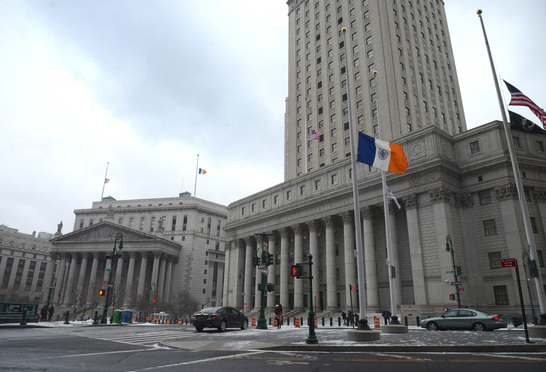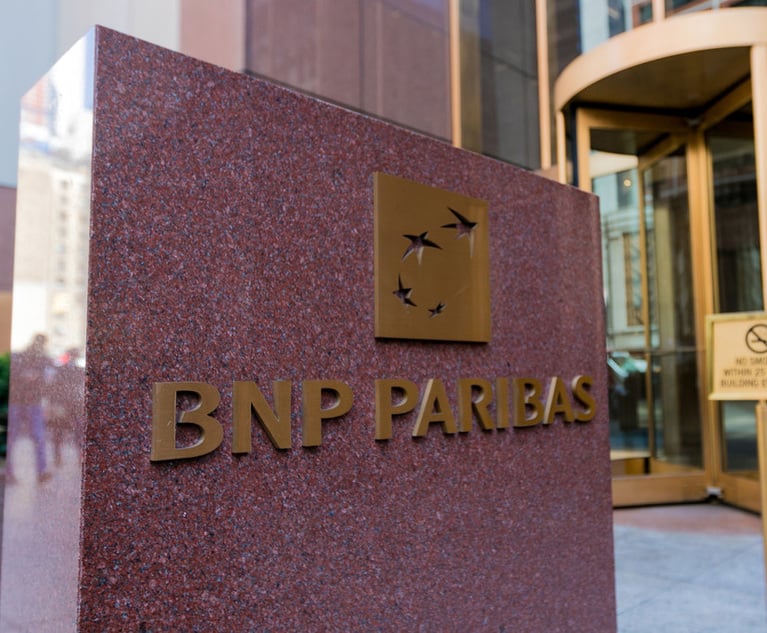Investment Fund Challenges Ruling in Herrick Malpractice Fight
An investment company founded by the late Sheldon Gordon is crying foul after an arbitrator failed to find Herrick Feinstein liable for millions of dollars in alleged damages.
October 26, 2017 at 05:45 PM
4 minute read
 Manhattan Supreme Court and the Thurgood Marshall U.S. Courthouse at Foley Square. Photo by Rick Kopstein/ALM
Manhattan Supreme Court and the Thurgood Marshall U.S. Courthouse at Foley Square. Photo by Rick Kopstein/ALM The investment arm of a deceased real estate executive is seeking to overturn an arbitration ruling that faulted Herrick Feinstein in a legal malpractice action but did not order the law firm to pay any damages.
Gordon Group Investments, formed by the late Sheldon Gordon, who found success in developing entertainment shopping centers, alleges in a petition filed in Manhattan Supreme Court this week that the ruling of JAMS arbitrator Robert Davidson in a legal malpractice arbitration against Herrick Feinstein disregarded the burden of proof and rendered the arbitration process unfair.
Gordon Group said it retained Herrick Feinstein in late 2009 after it was defrauded by a rogue bond trader who made unauthorized purchases of stock “in an elaborate pump and dump scheme.” Gordon Group said Herrick promptly filed in state court tort and other claims against the trader and others, but waited 13 months before considering the timeliness of the client's contract claim against Fortis Investment Services, a clearing broker that was acquired by BNP Paribas. The claim against Fortis was subject to arbitration before the Financial Industry Regulatory Authority.
Herrick did not seek a tolling agreement with Fortis or tell Gordon Group that Herrick's delay was destroying the value of its Fortis claim, Gordon Group claims. Gordon Group said it was advised by then-Herrick attorneys David Feuerstein and John Goldman.
Herrick, it claims, finally brought a FINRA arbitration against Fortis in March 2011, and argued then that its damages were $23.4 million plus interest, totaling $45 million. A FINRA panel in November 2015 awarded Gordon Group $11.3 million in compensatory damage but did not explicitly grant or deny interest.
In a legal malpractice arbitration brought against Herrick last year, Gordon Group argued the FINRA award was only based on the unauthorized trades that cleared Fortis inside the statute of limitations timeframe and a 9 percent statutory interest. Gordon Group's expert witness at the malpractice arbitration, Robert Smith, a former judge of the New York Court of Appeals, testified that it was “very likely” that the FINRA panel credited the statute of limitations defense asserted in the FINRA arbitration as a result of Herrick's inaction, Gordon Group said.
In a July decision, the arbitrator, Davidson, found Herrick's “failure to assure” that the statute of limitations on the Fortis claim was tolled or that the client was fully informed of the danger in waiting to bring a claim “fell below the ordinary and reasonable skill and knowledge” commonly possessed by a member of the profession. However, in considering damages, Davidson found “the truth of the matter is that no one knows how the arbitrators [in the FINRA action] came up with their number.”
Gordon Group's petition, filed Tuesday, argues that the arbitrator applied the wrong standard of proof and the ruling resulted in an unfair arbitration process. Its petition seeks to vacate the award and send the parties back to arbitration to establish damages.
“We believe the evidence shows that the damages including interest were roughly $28 million,” said James Kennedy, Gordon Group's attorney and a partner of Kennedy Berg in New York.
A Herrick Feinstein spokesman could not immediately comment. Feuerstein, now a partner at Feuerstein Kulick, did not return a message for comment, while Goldman, who left Herrick in September, declined to comment.
This content has been archived. It is available through our partners, LexisNexis® and Bloomberg Law.
To view this content, please continue to their sites.
Not a Lexis Subscriber?
Subscribe Now
Not a Bloomberg Law Subscriber?
Subscribe Now
NOT FOR REPRINT
© 2025 ALM Global, LLC, All Rights Reserved. Request academic re-use from www.copyright.com. All other uses, submit a request to [email protected]. For more information visit Asset & Logo Licensing.
You Might Like
View All
The CFPB Is Digging In for Last Days of Biden's Term. But What Happens Next?
6 minute read

NY AG James Targets Crypto Fraud Which Allegedly Ensnared Victims With Fake Jobs
4 minute read
'Merciless' Filing Deadline Dooms Cuban Americans' Property-Trafficking Suit Against BNP Paribas, SocGen
4 minute readTrending Stories
- 1Is It Time for Large UK Law Firms to Begin Taking Private Equity Investment?
- 2Federal Judge Pauses Trump Funding Freeze as Democratic AGs Launch Defensive Measure
- 3Class Action Litigator Tapped to Lead Shook, Hardy & Bacon's Houston Office
- 4Arizona Supreme Court Presses Pause on KPMG's Bid to Deliver Legal Services
- 5Bill Would Consolidate Antitrust Enforcement Under DOJ
Who Got The Work
J. Brugh Lower of Gibbons has entered an appearance for industrial equipment supplier Devco Corporation in a pending trademark infringement lawsuit. The suit, accusing the defendant of selling knock-off Graco products, was filed Dec. 18 in New Jersey District Court by Rivkin Radler on behalf of Graco Inc. and Graco Minnesota. The case, assigned to U.S. District Judge Zahid N. Quraishi, is 3:24-cv-11294, Graco Inc. et al v. Devco Corporation.
Who Got The Work
Rebecca Maller-Stein and Kent A. Yalowitz of Arnold & Porter Kaye Scholer have entered their appearances for Hanaco Venture Capital and its executives, Lior Prosor and David Frankel, in a pending securities lawsuit. The action, filed on Dec. 24 in New York Southern District Court by Zell, Aron & Co. on behalf of Goldeneye Advisors, accuses the defendants of negligently and fraudulently managing the plaintiff's $1 million investment. The case, assigned to U.S. District Judge Vernon S. Broderick, is 1:24-cv-09918, Goldeneye Advisors, LLC v. Hanaco Venture Capital, Ltd. et al.
Who Got The Work
Attorneys from A&O Shearman has stepped in as defense counsel for Toronto-Dominion Bank and other defendants in a pending securities class action. The suit, filed Dec. 11 in New York Southern District Court by Bleichmar Fonti & Auld, accuses the defendants of concealing the bank's 'pervasive' deficiencies in regards to its compliance with the Bank Secrecy Act and the quality of its anti-money laundering controls. The case, assigned to U.S. District Judge Arun Subramanian, is 1:24-cv-09445, Gonzalez v. The Toronto-Dominion Bank et al.
Who Got The Work
Crown Castle International, a Pennsylvania company providing shared communications infrastructure, has turned to Luke D. Wolf of Gordon Rees Scully Mansukhani to fend off a pending breach-of-contract lawsuit. The court action, filed Nov. 25 in Michigan Eastern District Court by Hooper Hathaway PC on behalf of The Town Residences LLC, accuses Crown Castle of failing to transfer approximately $30,000 in utility payments from T-Mobile in breach of a roof-top lease and assignment agreement. The case, assigned to U.S. District Judge Susan K. Declercq, is 2:24-cv-13131, The Town Residences LLC v. T-Mobile US, Inc. et al.
Who Got The Work
Wilfred P. Coronato and Daniel M. Schwartz of McCarter & English have stepped in as defense counsel to Electrolux Home Products Inc. in a pending product liability lawsuit. The court action, filed Nov. 26 in New York Eastern District Court by Poulos Lopiccolo PC and Nagel Rice LLP on behalf of David Stern, alleges that the defendant's refrigerators’ drawers and shelving repeatedly break and fall apart within months after purchase. The case, assigned to U.S. District Judge Joan M. Azrack, is 2:24-cv-08204, Stern v. Electrolux Home Products, Inc.
Featured Firms
Law Offices of Gary Martin Hays & Associates, P.C.
(470) 294-1674
Law Offices of Mark E. Salomone
(857) 444-6468
Smith & Hassler
(713) 739-1250






